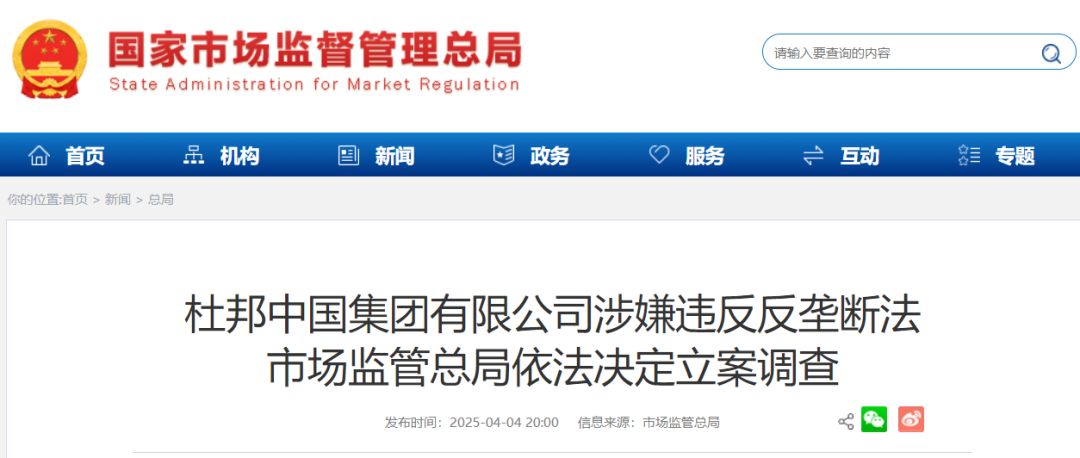Sudden! DuPont China Under Investigation
On April 4, the State Administration for Market Regulation of China announced that DuPont China Holding Co., Ltd. is being investigated for suspected violations of the Anti-Monopoly Law of the People's Republic of China. The market regulation authority has initiated a formal investigation against DuPont China Holding Co., Ltd. in accordance with the law.
The specific reasons are still unknown, but against the backdrop of China's strong emphasis on foreign investment, the investigation into DuPont China may highlight China's determination to create a fairer market environment or have profound effects on the operating models of multinational companies in China.
It is reported that DuPont established its office in Beijing in 1984 and set up its first wholly foreign-owned enterprise, DuPont China Group Limited, in Shenzhen in 1988, becoming the first wholly foreign-owned investment company approved by the Chinese government.

It is reported that by 2025, DuPont will have more than 40 wholly-owned and joint ventures in China, covering the entire industrial chain from basic chemical materials to high-end automotive and electronic solutions. Some of the core brands mainly include:
Kevlar®: para-aramid fiber, mainly used for protective equipment, industrial and technological applications, and sports equipment.
Nomex®: meta-aramid fiber, whose needle-punched products are mainly used as high-temperature filtration materials and insulation materials;
Tyvek®: A 100% high-density polyethylene nonwoven fabric produced using flash-spun technology, featuring waterproof, breathable, tear-resistant, and eco-friendly recyclable properties. It has a smooth surface suitable for printing and is used in medical, industrial, and active packaging applications.
Cyrel®: Focused on flexographic printing solutions, especially optimized printing plates for UV-LED technology.
Artistri®: Water-based digital printing inks covering textiles, packaging, and commercial printing;
Corian®: artificial stone material;
Tedlar®: Polyvinyl fluoride (PVF) film, used in photovoltaics, etc.
MOLYKOTE®: Special Lubricating Oil;
Liveo™: Silicone elastomers, silicone skin adhesives, transdermal adhesives and other silicone applications;
Solamet®: Photovoltaic conductive paste
However, in terms of popularity, apart from nylon and aramid, DuPont also has globally leading products such as Dupont™ Teflon (polytetrafluoroethylene), Riston™ (dry film photoresist technology), Kapton® (high-temperature resistant polyimide film), Pyralux® (polyimide flexible circuit materials), Kalrez® (perfluoroelastomer seals), and Delrin® homopolymer acetal.
DuPont's base layout in China is centered around the Yangtze River Delta (Shanghai, Jiangsu, Zhejiang) and the Pearl River Delta (Guangdong), radiating nationwide. Among them, the most well-known is the DuPont Zhangjiagang base, located in the Yangtze River International Chemical Industrial Park of Zhangjiagang Free Trade Zone. The products include Zytel® nylon engineering plastics, Delrin® homopolymer formaldehyde resin, Hytrel® thermoplastic polyester, Multibase thermoplastic elastomer (TPE), lubricants, and special organic silicone materials. It has also established the Zhangjiagang adhesive integration project, with the main products being adhesives and related materials.
BETAFORCE™ TC thermally conductive adhesive and BETATECH™ thermally conductive gap filler—supporting battery thermal management in hybrid and electric vehicles during charging and operation.
(2) BETAFORCE™ Composite Adhesive - For Battery Sealing and Assembly;
(3) BETAMATE™ Wide Bake Temperature Adhesive and Structural Adhesive – Used for automotive body structures and battery bonding, it enhances the vehicle's crash resistance and reduces the weight of the body structure.
Adhesives play a pivotal role in the automotive industry. According to data from the China Adhesives and Tape Industry Association, the adhesive usage per vehicle in new energy vehicle power battery assembly (including PACK sealing, structural thermal conduction, structural bonding, BMS protection, cell bonding, battery potting, thread locking, and shell bonding) will reach approximately 5 kilograms. Additionally, automotive electronics (such as power inverters, control modules, displays, reverse radar systems, etc.) are another major application area for adhesives. Among these, thermal conductive adhesives are particularly important—the greater the computational demand, the higher the thermal conductivity requirements, and the more thermal conductive adhesive is used.
In addition to being placed under investigation, on the same day, April 4th, the Tariff Policy Committee of the State Council issued an announcement to impose an additional 34% tariff on all imported goods originating from the United States, based on the existing applicable tariff rates. DuPont, which owns many market-leading products, will also be affected.
In 2024, DuPont's total net sales were $12.386 billion (approximately 90.5 billion yuan), with the Greater China region accounting for 18% of the revenue. Given the importance of this market, how will DuPont China respond to the current crisis?
【Copyright and Disclaimer】The above information is collected and organized by PlastMatch. The copyright belongs to the original author. This article is reprinted for the purpose of providing more information, and it does not imply that PlastMatch endorses the views expressed in the article or guarantees its accuracy. If there are any errors in the source attribution or if your legitimate rights have been infringed, please contact us, and we will promptly correct or remove the content. If other media, websites, or individuals use the aforementioned content, they must clearly indicate the original source and origin of the work and assume legal responsibility on their own.
Most Popular
-

Amcor Opens Advanced Coating Facility for Healthcare Packaging in Malaysia
-

ExxonMobil and Malpack Develop High-Performance Stretch Film with Signature Polymers
-

Plastic Pipe Maker Joins Lawsuit Challenging Trump Tariffs
-

Pont, Blue Ocean Closures make biobased closures work
-

Over 300 Employees Laid Off! Is Meina Unable to Cope?

